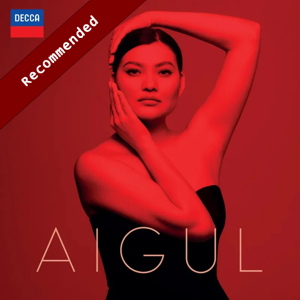
Aigul Akhmetshina (mezzo-soprano)
Aigul
Apollo Voices
Royal Philharmonic Orchestra/Daniele Rustioni
rec. 2023/2024, St Jude on-the-Hill, London, UK Contents beneath review
Texts and translations included
Decca 4870262 [52]
At only 27, Bashkir mezzo-soprano Aigul Akhmetshina is already the Carmen du jour, having sung the role at both the Met and Covent Garden; this is her debut recording album offering a rather short programme which gives pride of place to four excerpts from that opera, then offers three more central arias from famous operatic vehicles for mezzos, concluding with a traditional Bashkir encore. It is not an especially original line-up but it is certainly a challenging one and as such puts Akhmetshina in competition with some of the most celebrated exponents of her Fach.
Fast flickering vibrato, a deep, vibrant tone, resonant lower register, huge top notes – very “true contralto” in timbre – beautifully controlled portamenti. Her French is correct but one or two vowels and diphthongs still sound too generalised and need attention, such as in “loi” and there is a lack of ironic twang in the delivery of phrases such as “Je l’ai mis à la porte hier” – but other things are impressive, such as the abandon of the rising “Tra-la-la” phrase concluding the Seguidilla. I am not especially impressed by the somewhat shrill vocal production of the two supporting sopranos and Freddie di Tommaso has little to do – but what there is he does well, if in typically rather stentorian fashion.
Akhmetshina’s voice is undoubtedly lovely – although sometimes I miss those little flickers and stabs which with singers such as Callas and Troyanos invest Carmen with an indelible individuality. Having said that, her delivery of Charlotte’s pondering over Werther’s letters is mesmerising in its intensity and emotional range; the velvety sheen of her voice never masks the pain of her utterance and her top notes are searing. The saxophone introduction to “Va! Laisse couler mes larmes” acts as an instrumental counterpart and intensifier to the grainy, smoky concentration of her mezzo. The switch from this overtly Romantic mode to the flowing, cantilena line of Bellini’s manner of Romeo’s arias is almost shocking but the listener’s ear is soon seduced by the ease of Akhmetshina’s adaptation to its demands; in many ways she reminds me of a great predecessor in this music: Agnes Baltsa. The conclusion to “La tremenda ultrice spada” (track 8) brings a real surprise: a completely secure and thrilling top D climax – wow; just wow.
The Rossini items demonstrate Akhmetshina’s vocal dexterity in coloratura as well as a nice fluency in Italian – even if I could ask for more definition and bite in her diction. They are nonetheless balm to the ears. “Una voce poco fa”- one of the most famous of Rossini’s arias – is delivered with tremendous aplomb and confidence – and some splendidly trenchant low notes to balance the ringing upper range; this is a beautifully balanced voice throughout range. Her intonation and rhythmic sense are impeccable.
The encore is stylistically incongruous but who cares when it engages such a lovely voice? It is in fact eerily similar in both style and orchestration to Canteloube’s Chants d’Auvergne and could easily be assimilated into that collection were it not for its native language. Akhmetshina sings it ecstatically, full-voiced, putting the cap on a splendid recital. She is still a young singer and has time to develop more variety of timbre and the acuity of textual inflection which marks out the greatest singers; meanwhile I heartily welcome one of the most promising voices of this type for years.
Ralph Moore
Buying this recording via a link below generates revenue for MWI, which helps the site remain free.


Contents
Georges Bizet (1838-1875)
Carmen
Aigul Akhmetshina (mezzo-soprano): Carmen
Freddie De Tommaso (tenor): Don José
Elizabeth Boudreault (soprano): Frasquita
Kezia Bienek (mezzo-soprano): Mercédès
1. Habanera “L’amour est un oiseau rebelle”
2. Seguidilla “Pres des remparts de Seville”
3. Card Scene “Melons! Coupons!”
4. “Carreau! Pique! La mort!”
Jules Massenet (1842-1912)
Werther
5. Letter Scene: “Werther! Qui m’aurait dit la place”
6. “Va! Laisse couler mes larmes” (Air des larmes)
Vincenzo Bellini (1801-1835)
I Capuleti e i Montecchi
7. “Ascolta! Se Romeo t’uccise un figlio”
8. “La tremenda ultrice spada”
9. “Tu sola, o mia Giulietta …Deh! tu, bell’anima”
Gioachino Rossini (1792-1868)
La cenerentola
10. “Nacqui all’ affanno e al pianto”
11. “Non più mesta”
Il barbiere di Siviglia
12. “Una voce poco fa”
13. “Io sono docile”
Traditional Bashkir
14. The Nightingale (arr. Kamil Yusufovich Rakhimov for voice and orchestra )

















